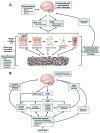Brain-gut microbiome interactions and functional bowel disorders
- PMID: 24583088
- PMCID: PMC4114504
- DOI: 10.1053/j.gastro.2014.02.037
Brain-gut microbiome interactions and functional bowel disorders
Abstract
Alterations in the bidirectional interactions between the intestine and the nervous system have important roles in the pathogenesis of irritable bowel syndrome (IBS). A body of largely preclinical evidence suggests that the gut microbiota can modulate these interactions. A small and poorly defined role for dysbiosis in the development of IBS symptoms has been established through characterization of altered intestinal microbiota in IBS patients and reported improvement of subjective symptoms after its manipulation with prebiotics, probiotics, or antibiotics. It remains to be determined whether IBS symptoms are caused by alterations in brain signaling from the intestine to the microbiota or primary disruption of the microbiota, and whether they are involved in altered interactions between the brain and intestine during development. We review the potential mechanisms involved in the pathogenesis of IBS in different groups of patients. Studies are needed to better characterize alterations to the intestinal microbiome in large cohorts of well-phenotyped patients, and to correlate intestinal metabolites with specific abnormalities in gut-brain interactions.
Keywords: Dysbiosis; Irritable Bowel Syndrome; Probiotics.
Copyright © 2014 AGA Institute. Published by Elsevier Inc. All rights reserved.
Figures

References
-
- Frazier TH, DiBaise JK, McClain CJ. Gut microbiota, intestinal permeability, obesity-induced inflammation, and liver injury. JPEN J Parenter Enteral Nutr. 2011;35:14S–20S. - PubMed
Publication types
MeSH terms
Substances
Grants and funding
LinkOut - more resources
Full Text Sources
Other Literature Sources
Medical

